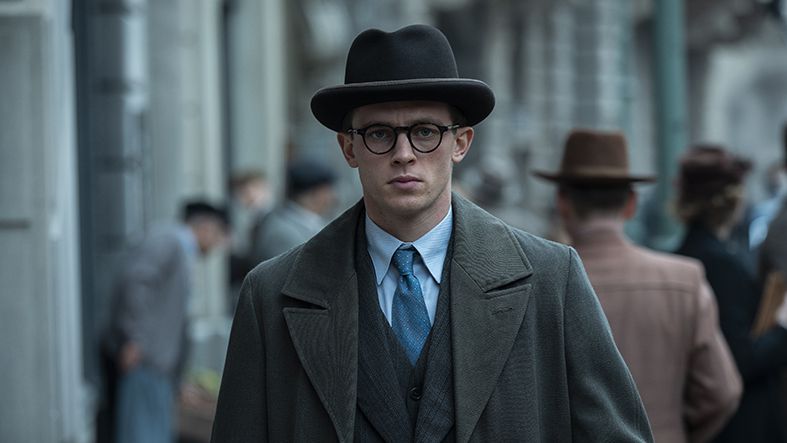Munich The Edge of War movie review: If Jannis Niewöhner’s Paul von Hartmann were the centre of this story, the film would have a lot going for it. As it is, it is just one among many mediocre films about World War II.
Munich The Edge of War movie cast: Jeremy Irons, George MacKay, Jannis Niewöhner
Munich The Edge of War movie director: Christian Schwochow
Munich The Edge of War rating: 2 stars
Europe, 1938. Hitler’s Nazi leviathan is extending its tentacles all over mainland Europe. British Prime Minister Neville Chamberlain naively believes the Führer can still be talked out of a full-fledged war. But other British leaders, including Winston Churchill, believe it is futile, and war with Germany is inevitable.
Chamberlain’s tenure was characterised by many such appeasements of fascistic powers. He held diplomatic negotiations with Hitler, and basically offered him the Sudetenland territory in Czechoslovakia he had already in his possession if he toned down his expansionist policies. Hitler being Hitler was happy to feign agreement, but in the following year, annexed the entirety of Czechoslovakia.
Christian Schwochow’s Munich – The Edge of War, based on author Robert Harris’ novel of the same name, uses that setting to insert two fictional friends — one English and one German — into the narrative.
Hugh Legat (George MacKay) is an Englishman and one of Chamberlain’s secretaries. He was friends with a German classmate Paul von Hartmann (Jannis Niewöhner) in his university days at Oxford, but the two friends have since fallen out due to Hartman’s endorsement of Hitler before his rise to power, despite his deleterious ideas.
Hartman is now a diplomat disillusioned with Hitler’s, er, domestic policies and part of a secret coterie trying to bring him down. As the peace talks are in process, Hartmann, in possession of a document that details Hitler’s Europe-conquering plans, approaches British intelligence through a back channel to hand it over to Chamberlain and convince him not to sign the peace agreement, as that would give Hitler a pretext for war.
We know Chamberlain did sign the agreement, and had to resign in ignominy when Hitler invaded the Low Countries the following year. But, as far as we know, he did not know of Führer’s designs, although the dictator did not exactly make it a secret as to what he thought of Jews, Roma and others.
The Edge of War had a great opportunity to explore what made conscientious Germans rally behind a genocidal maniac like good little children. How Hartmann, a smart and educated man, was seduced by Hitler’s hackneyed populist rhetoric?
Instead, the film is sadly more concerned with dull bureaucratic proceedings, and wants to instill a sense of suspense when we are all painfully aware of the end result. It doesn’t work. It would have worked if story had been alternate-history, and was leading the audience to an unknown outcome. (Perhaps Hitler wins and conquers the world in this reality? Or perhaps he is shot down before he can do atrocious things to Jews?)
A considerable distance from the diplomatic goings-on would also have worked in the film’s favour. There is no dearth of movies and books dramatising the events that led to World War II. But there are precious few stories that examine a friendship divided by national and ideological borders in that era.
The fictional elements of the story also do not fit seamlessly into the narrative. For instance, the coterie of discontented German officials who wished to turn the Wehrmacht against Hitler in the film is based on a real plot to get rid of Hitler that occurred in 1944. But prime instigator Claus von Stauffenberg of the abortive July Plot, as it is called, actually agreed with Hitler on his racist and xenophobic views. He simply felt Hitler was losing his way.
The performances, despite a solid cast, are also quite disappointing. An actor of Jeremy Irons’ calibre is saddled with a thinly written Chamberlain, who has an endlessly cheery attitude and a strangely belligerent allergy to reason. MacKay is pretty good, but he only has to do variations of dumbfounded blank expressions that he learned from Sam Mendes’ war drama 1917. Female characters are given short shrift. Niewöhner is out and out great, and easily the best of the lot. If Hartmann were the centre of this story, the film would have a lot going for it.
As it is, it is just one among many mediocre films about World War II.



